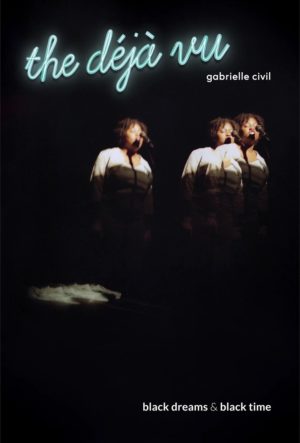You have no items in your cart. Want to get some nice things?
Go shopping
I hadn’t heard of Gabrielle Civil or read anything by her until this book, the déjà vu: black dreams and black time, but I will be researching her career now and looking for her performance pieces as well as her writing. This book is good, and I want to know more about its creator. Civil is a Black feminist performance artist, poet, and writer originally from Detroit. She now teaches at the California Institute of the Arts but has been in lots of roles in lots of places. She is a cultural sponge who seems to learn and create wherever she has been.
This book offers a cornucopia of pleasures: poetry – both by Civil and by poets she admires – prose, play scripts, letters, photographs, snippets, performance pieces, journal entries…a very diverse range of forms. The whole gives a unique look into a creative mind that is rich and insightful and fresh. I really enjoyed this book, even allowing that I am a retired white woman in England who has little in common with the author.
The book was written during the pandemic and lockdown, shortly after Civil moved to California to start her dream job. She was isolated and, like many in the horrible circumstances of coronavirus, lonely and feeling a bit lost. There were also hideous injustices and political hurt in a tumultuous time for her country. She describes it as: “It was a terrible time in these dis-United States. Suffering and injustice surged and seemed unstoppable.”
One of the most moving pieces in the book is Civil talking about a mural she comes across in Montreal. It is a huge wall painting in memory of sex workers who have died. In a city with yoga studios and homeless people just like everywhere else, this is different. This brings her up short to stare. In the mural, there is a city skyline and figures of five people of colour holding a sign that says: “We honour the more than 60 sex workers, most of them indigenous, who were killed or kidnapped in Vancouver BC.” The author then meditates on what the memorial “means,” how does it honour these people, how does the fact the mural has been defaced with graffiti reflect this honouring? The defacing is in a sense adding to the art, but it isn’t respectful. As Civil asks, what if someone defaced a memorial to 9/11? How would that be received? Who would have dared do the defacing?
The poet and performance artist Jaamil Olawale Kosoko says that in this book “Civil soldiers for the possibility of black life to dream beyond the confines of colonialist rhetoric laden within modern world systems…,” and there are a lot of references to dreams and dreaming. Both the nighttime odysseys and the daytime yearnings. Civil believes in the transportation properties of dreaming and our ability to see outside and beyond our experiences by paying attention to intuition and memories:
And so I entered the field of imagination and was consumed. I would wake up with words pouring out of me, reaching for my notebook ~~~~~~~~~~~~~~~~~it tumbled from dreams ~~~~~~~~~~~~~ I started writing about dreaming, writing about time, what was happening, what had happened, what could happen in my lifetime.
Time is another thread through the narrative, another way of examining and researching life and the way we progress through it. We assume life is lived linearly and the same for us all, but it is not so for the author:
What happens if we take our time?
Dreams tell us that rest is not passive.
I don’t like teen movies because they lie/They pin coming of age to a particular time/when as the Black Quantum Futurists say:/ TIME IS NOT ALIGN. Freudian slip./Time is not a line.
Those short few sentences pack in so much and could have a class close reading for days, but it is typical of the work here, of the depth of the learning, and yet the lightness of touch.
A section I found very interesting is where Civil talks about Haitian art. Apparently the art of Haiti was “discovered” by a white US man… “The story of the white male US citizen discovering primitive Haitian artists has been simply too appealing to resist. The counter narrative of Haitian artists and intellectuals mobilizing their own vision, talent, and cultural nationalism is far less marketable.” This idea that someone “discovers” something that has happily long existed is a racist and insulting trope. Can you discover the art of a country? Can you discover a country? But repeatedly we are told that. This section deconstructs the whole concept, and Civil asks: Why is it acceptable for Haitian art to have more value and mobility than Haitian people?
Civil talks the talk and walks the walk. She stops her students – especially young black women – putting themselves down and being self-deprecating. She changes her own behaviour to model a strong female striding through the world and encourages her black students to own their abilities. Being a professor is a different kind of performance and allows the author to solidify courage, self-confidence, and body love, which she then hopes to see mirrored in her students.
Two final quotes to sum up this remarkable book by a beautiful wordsmith:
There can be no excellence, academic or otherwise, without dreaming. There can be no excellence without the space and time to generate new visions and possibilities.
I want to be able to take a chance, to try something new, to be bad and good, to say something that could be wrong, and to be capable of taking the blowback.
The author doesn’t say this is what you should be thinking; she says these are the sorts of things you should be thinking about. Leaving you to make up your own mind is challenging and fascinating when the topics are presented from a Black feminist perspective, which might be alien to some readers. It is impossible to accept history and historiography without thinking who wrote it and what were their motives or biases.
Gabrielle Civil is funny, generous, humble, and compassionate: “I’m certainly no Toni Morrison (writer goddess queen!), but her words made me think about how our language can hold cultural memory.”I reckon she runs Toni Morrison close, though, with the beauty of her writing. Read it to understand Black feminism and to learn how to inhabit your space with generosity and bravery. And don’t forget to dance to Prince. One of the many excellent things about this book is the list in the back of further reading, references quoted, and music to listen to. I feel I’ve had dinner with a learned soul who enriched me without patronising me and helped me – briefly – to walk in another world.
the déjà vu: black dreams and black time
By Gabrielle Civil
Coffee House Press, 240 pages
About Anne Maguire
Anne Maguire is a retired Chartered Engineer who worked in construction and facilities management. She now fills her time reading, writing and procrastinating. Addicted to studying, Anne will often be found working through a MOOC on Philosophy, Sociology, or the craft of Writing. Her new subject is screenwriting and she has an ambition to get working class lesbians represented on television.




